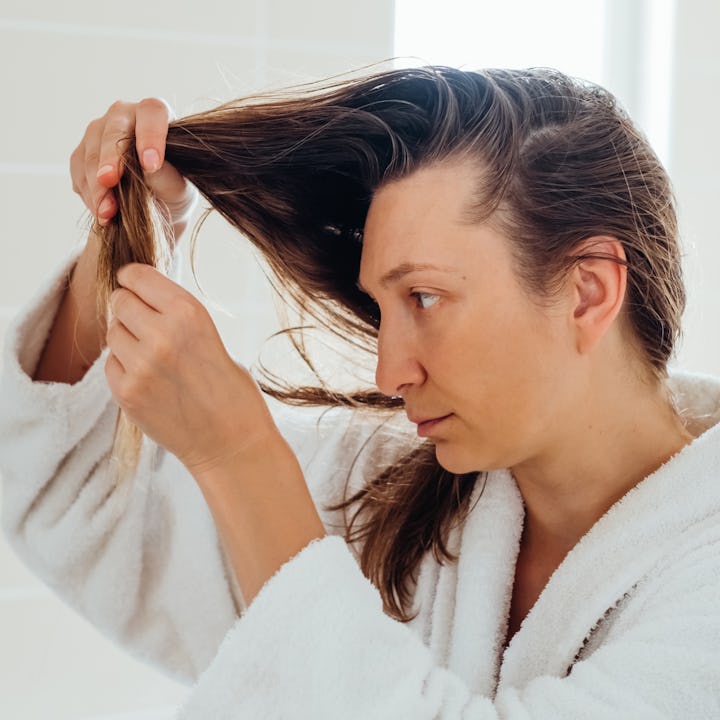Can Your Hair Really “Get Used” To Shampoo? Experts Explain That Dirty Feeling
Dermatologists explain why your hair doesn’t ever feel truly clean, and what to do when it happens.

If your scalp is itchy and irritated, or your hair feels weighed down and greasy, you might be wondering if your shampoo has just decided to quit its day job. That never-truly-clean feeling is super frustrating, especially when it starts interfering with how your hair looks or how you feel about yourself.
Whether you've heard a friend gripe about their products, seen people ask the question online, or pondered it yourself, we asked experts whether your hair can actually get used to your shampoo. And they say what you're feeling is legit... but has nothing to do with your follicles adjusting to what you're using.
Can your hair really get used to your shampoo?
What you're feeling — weighed-down hair that never feels fully clean — is a real thing. But saying that it happens because your hair gets used to your shampoo isn't quite the right language, according to Chris Adigun, M.D., FAAD, a board-certified dermatologist at Dermatology & Laser Center of Chapel Hill. That feeling that your shampoo has suddenly stopped doing its job is actually caused by product buildup.
Take someone with curly hair, for instance, who uses gels or creams to smooth and hold their coils. "It's very likely there will be synthetic agents such as mineral oil, petrolatum, and silicones added to products to make the hair smooth and lay flatter. And then you pair that with a conditioning shampoo that also has silicones to achieve the same benefit. Some shampoos are not going to remove as much of that kind of accumulated hair product as other shampoos will," Adigun says.
Depending on what shampoo you're using, you may notice that products build up in your hair even faster. "Not all shampoos effectively remove hair product, and some shampoos actually have product-like components in them," Adigun says.
Don't switch shampoos; just clarify.
So, what's the solution? Experts recommend starting with a clarifying shampoo. "If your hair becomes heavier, limp, or lifeless, it may just be a symptom of product buildup, and you need to do a clarifying shampoo," says Candace Spann, M.D., board-certified dermatologist and founder of ReTress, a hair care line for women's hair loss. "I do not think it's necessary to change your shampoo every few months just for the sake of changing your shampoo. In fact, by changing every few months, you're running the risk of creating issues where there wasn't one."
Clarifying shampoos are formulated to break down buildup and leave your hair truly clean. They're not supposed to be used often because they can strip the hair, but the surfactants in the formula "will trap those kind of grease type products within them and carry them off the hair," Adigun explains.
As Spann says, jumping to a new shampoo may not fix your buildup problem and could even open you up to new ones. "Some shampoos contain harsh sulfates that, for example, create a lot of really great lather but may be stripping your skin," Spann says. "If you start to experience your hair becoming very dry, that can be a symptom of your shampoo bothering you. Fragrances can also be very irritating. In fact, fragrances are the number one irritant worldwide. "You may end up developing what's called folliculitis, which is a little bit of an infection or pustules around the follicles. The scalp may become red or itchy."
She adds that you'll know you have the right shampoo and conditioner for you when your hair is styling well, feels clean and soft, and looks shiny. Adigun cautions anyone dealing with a flaky, itchy scalp to keep track of how long it persists. If it's still bothering you after you try a clarifying shampoo, it's probably time to check in with a dermatologist about it.
"If you continue to have a lot of scalp flaking after using a clarifying shampoo, you may have something known as seborrheic dermatitis, and you may need to see your dermatologist. Using clarifying shampoo once or twice should be enough to remove hair product. If they're still suffering, they likely have a dermatologic issue."
There are clarifying shampoos available at the drugstore and high-end cosmetics stores (like Sephora), depending on what you're comfortable spending. Give one a whirl and see if it whisks all those flakes and excess oil away. Then, you can keep using your old faithful shampoo and conditioner as you wish.